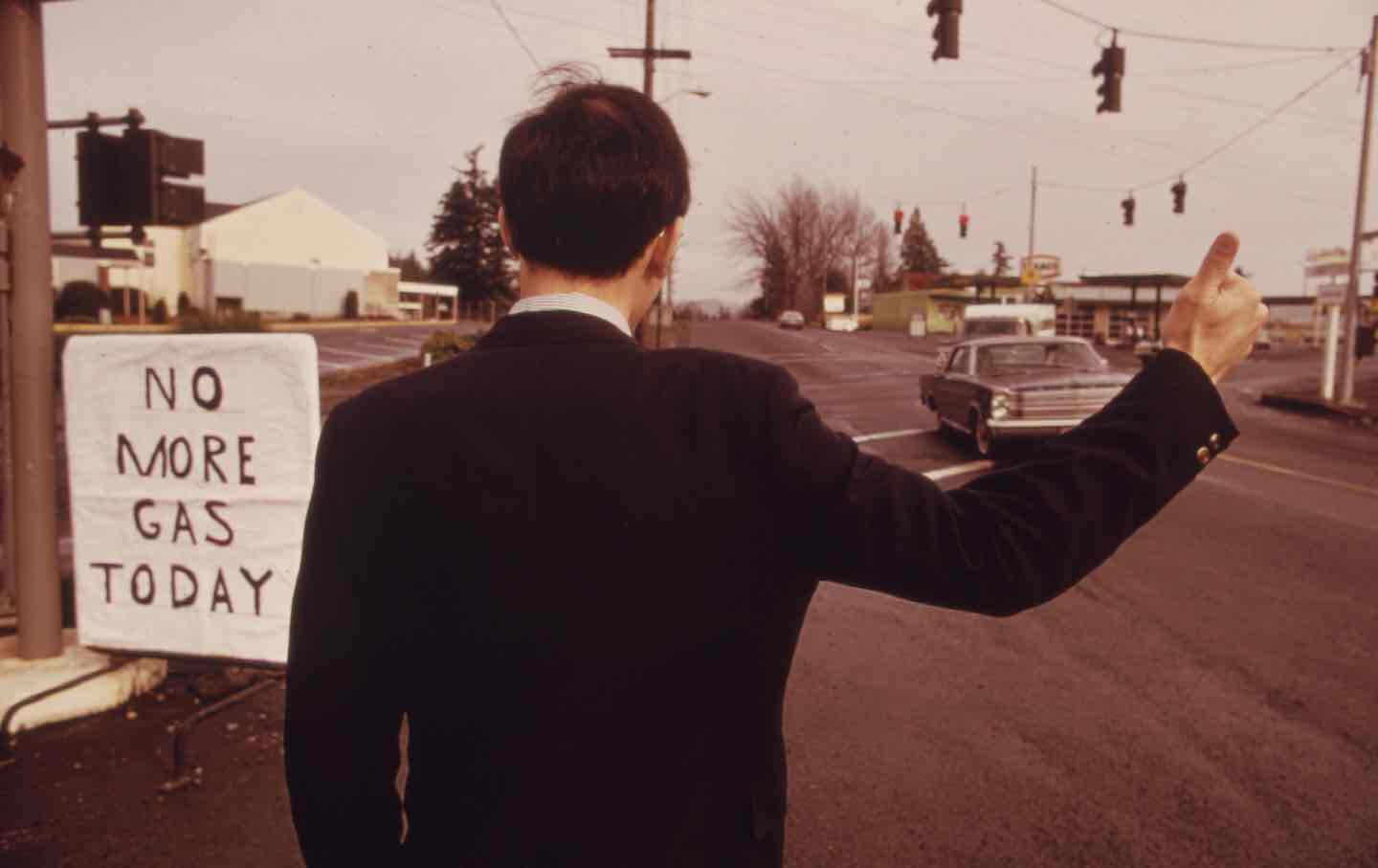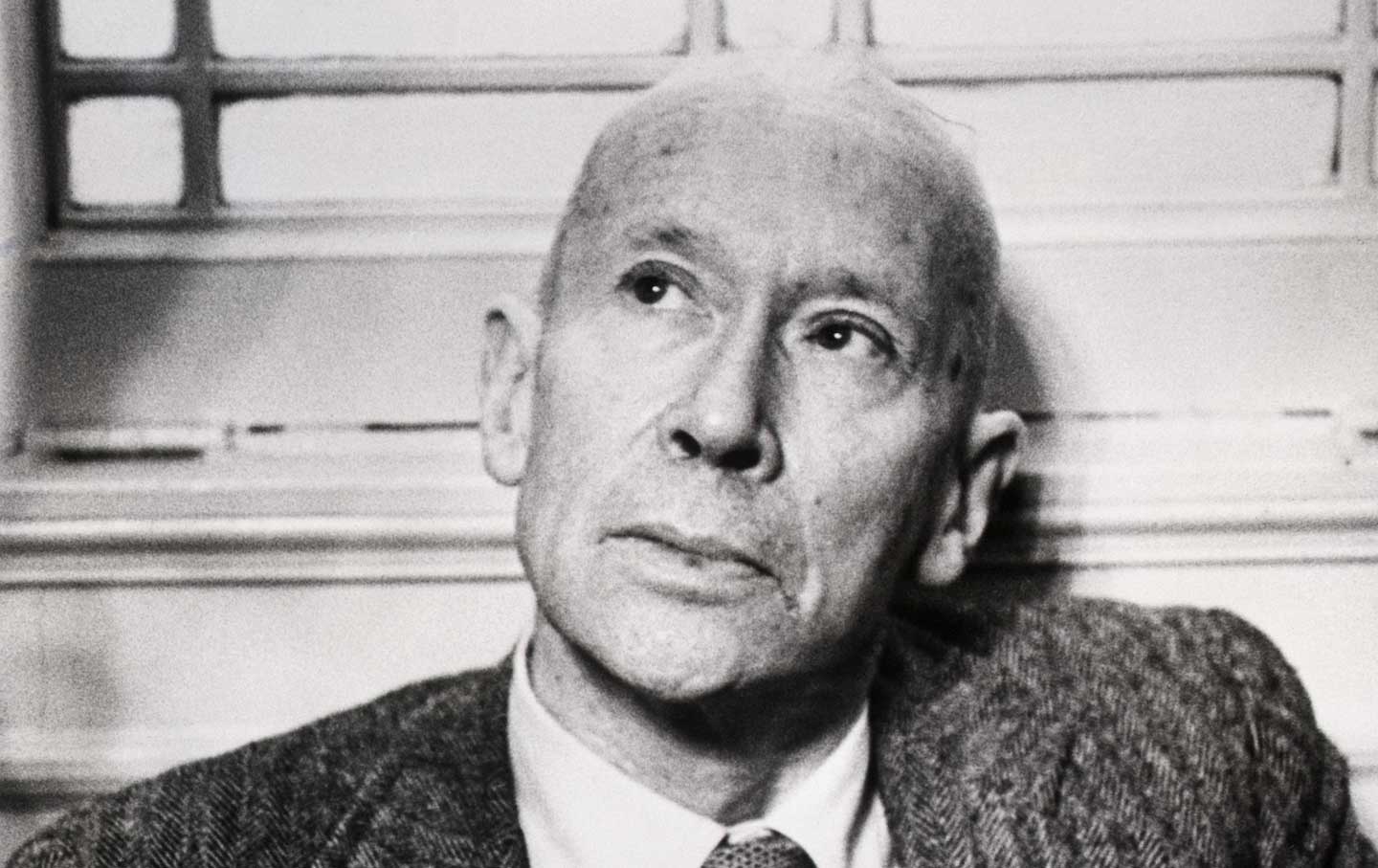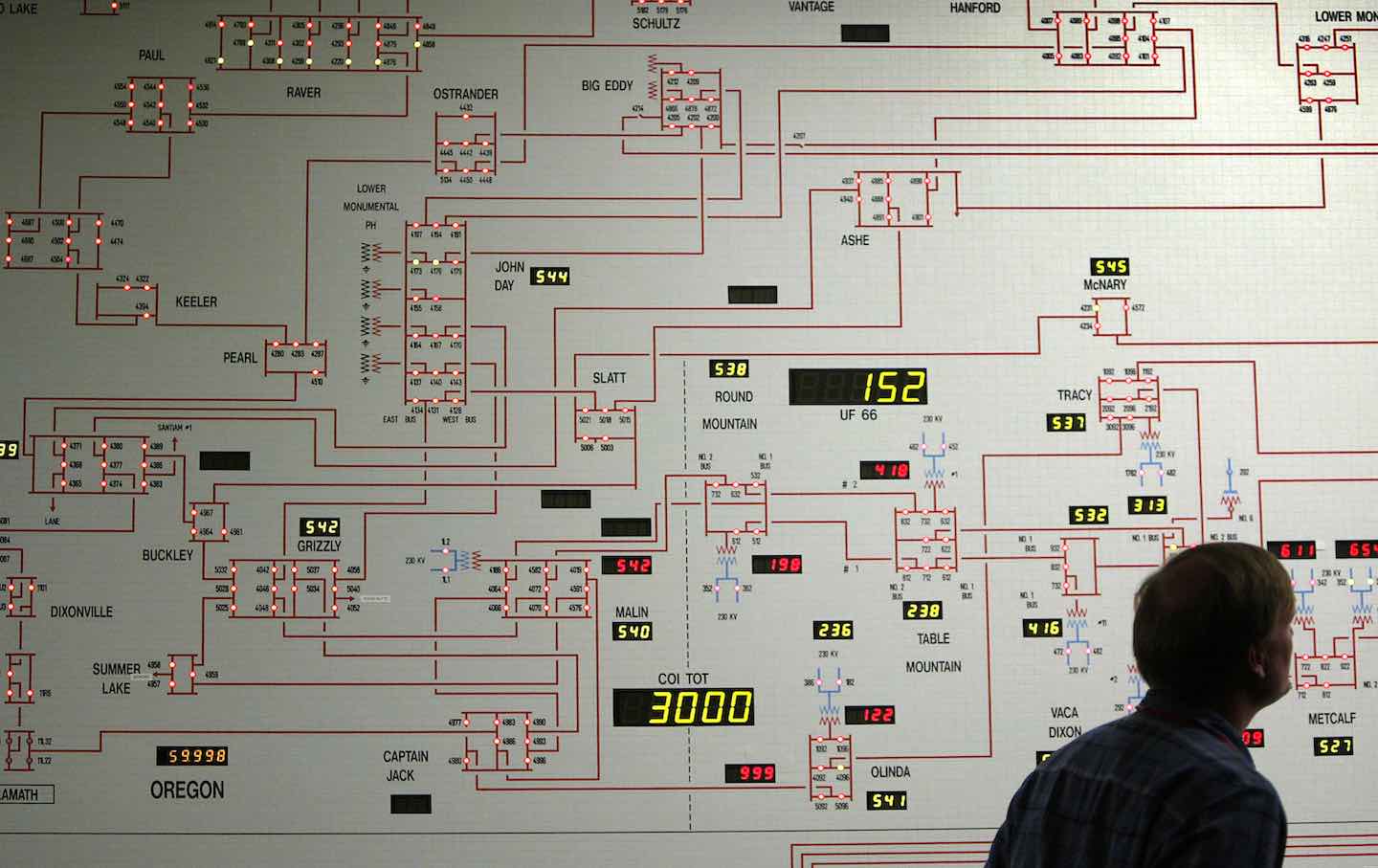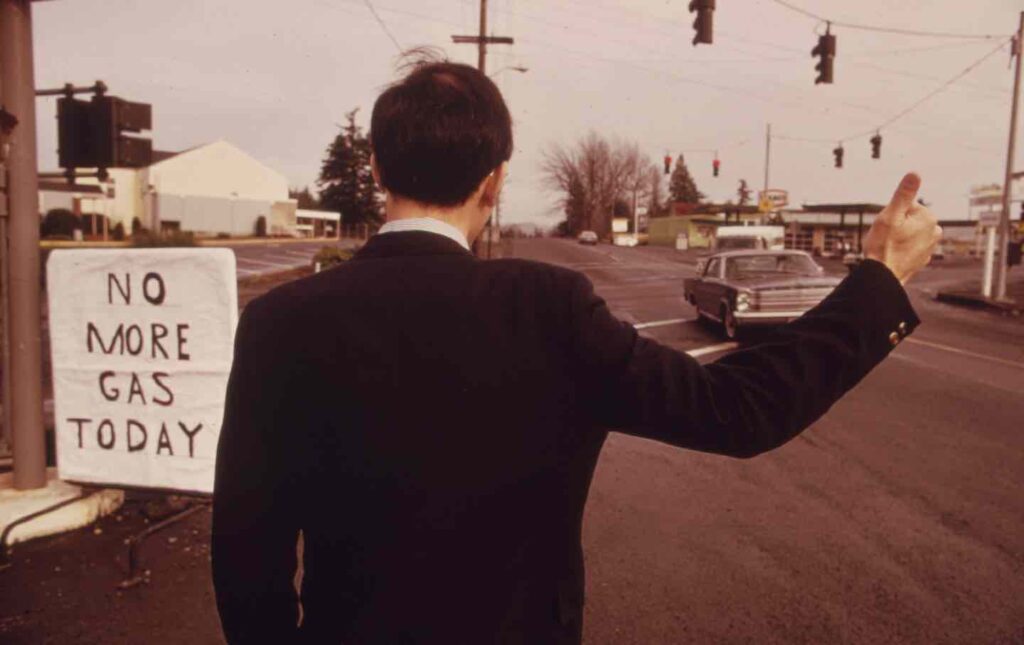Books & the Arts
/
September 26, 2023
Mobility, a novel by Lydia Kiesling, looks at the way fossil fuels defines life in public and private, shaping the very way we tell stories.

Elizabeth “Bunny” Glenn, the protagonist of Lydia Kiesling’s new novel Mobility, may work for the Turnbridge Oil Company, but that doesn’t mean she’s in oil. As she’s quick to remind anyone who asks, “I work for the non-oil part of it, the part that is moving away from oil; we are targeting batteries and energy storage, not oil.” And as she rationalizes to herself, all she does in her capacity as a marketer and administrator is “relay information, tell stories, shape narratives, soft things, things that didn’t really matter.”
Despite these disavowals, the fact is that Bunny has spent years trying to better understand the oil industry. It turns out to be a Sisyphean task: The basic schema of the industry—where many companies are vertically and horizontally integrated, mergers are a constant, and financialization has spawned its own sprawling sub-industry—intentionally obscures the full picture. The oil landscape is a quicksand of “names and names and names.” Every time Bunny learned a new one, “the map she had constructed in her mind shifted.” Meanwhile, her brother John, a do-gooder Peace Corps veteran who teaches English in Ukraine, teases Bunny that she’ll wind up like their uncle Warren, a garden-variety reactionary with a desk job at Motiva that earns him “a seemingly huge amount of money.”
More than halfway through the novel, John’s partner, Sofie—a Swedish journalist who covers fossil fuels—provides Bunny with a term that describes the oil industry’s elusiveness: “hyperobject.” Coined by the philosopher Timothy Morton in 2010, a hyperobject is something so large and complex, so distributed across both space and time, that it evades our comprehensive understanding, even as we cannot escape its presence in our life. “The more data we have about hyperobjects, the less we know about them—the more we realize we can never truly know them,” Morton argues. Oil is a hyperobject par excellence: Not only is it the result of a geologic process that is millions of years old, but there are reserves of crude oil all over the world, and its byproducts are found in innumerable consumer items: artificial limbs and toilet seats, lipstick and trash bags, refrigerators and contact lenses. As Bunny herself puts it, “It does touch everything. Absolutely everything.”
Even before Bunny started working at Turnbridge, her life had been touched by oil more directly than others’. As a Foreign Service brat in Azerbaijan in the late 1990s, her adolescence unfolded alongside the development of a new international order, and commodities like oil played a starring role in this transition. Four years before her family’s arrival in Baku, and three years after the country restored its independence from the Soviet Union, the State Oil Company of Azerbaijan Republic and a consortium of 11 foreign oil companies signed what was called the “contract of the century”: an agreement to jointly develop—and share the profits from—oil fields in the Azeri sectors of the Caspian Sea. Several of those foreign companies, of course, were American. Bunny’s father is sent to Azerbaijan in part to protect his country’s investment.
In Baku, some of the consequences of the newly privatized oil economy are obvious even to a self-absorbed 15-year-old like Bunny: a sulfuric smell on the beach, or the “mansions with no context” piled up on cliffsides outside of the capital. But most of what she learns about the industry comes via a more sentimental education—namely, crushes on the young men who have flocked to Azerbaijan to witness the so-called end of history. There is Eddie, a mild-mannered Brit making a documentary about the Nagorno-Karabakh War, who rents a room in the apartment above the Glenns’; and then there is Charlie, a hedonistic, hirsute American who publishes a guerrilla newspaper called The Intercock (short for Inter-Caucasian Times) covering “foreign activity in the former Soviet Union.”
At one point, while attending a party at an oil prospector’s mansion in Baku’s ancient inner city, Bunny bumps into her crushes smoking cigars with a gray-haired Amoco bureaucrat. After frightening the oilman off with a veiled reference to his taste for sex workers, Charlie turns to Bunny. “Do you want to hear the story of oil in the former Soviet Union?” he asks. Following her noncommital “I guess,” Charlie proceeds to unspool a profane monologue about the scramble for the Caspian’s riches amid the breakup of the USSR, featuring cameos by Mikhail Gorbachev, Ilham Aliyev, “Condoleezza fucking Rice,” BP, Chevron, Exxon, and more.
Current Issue

This speech, which unfolds across four pages, is for Bunny’s benefit, but also our own. By embedding crucial context in naturalistic dialogue, Kiesling is able to establish the historical conjuncture in which her book is set without resorting to dull exposition. But this formal choice is more than just a canny bit of craft; it also hints at the novel’s true subject. Recognizing the epistemological impasse that Bunny runs up against in her quest to master the industry’s inner workings, Mobility is not really about oil qua oil, but the way it is narrativized—both for good and for ill.
Mobility teems with storytellers, from investigative reporters, podcasters, and filmmakers to spin doctors, government public information officers, and oil CEOs, dictating their memoirs to underpaid female assistants. When Bunny eventually joins their ranks, it’s due less to any conscious choice than to circumstance. Personally and professionally adrift after graduating from college in the midst of the 2008 financial crisis, she moves in with her recently divorced mother in Texas and finds a job through a temp agency at Miles Engineering Consultants, a firm that provides “client satisfaction in the diverse fields of geophysics and seismology, hydrology, hydrogeology, and construction support.” Bunny is assigned to the admin pool, where she puts her English degree to work copy-editing inscrutable reports about prospective megaprojects, such as a nuclear power plant in the Persian Gulf. However tedious, it’s a task at which she excels. Not long after Bunny is hired, she meets Frank Miles—son of the company’s founder, and son-in-law to oil magnate Frank Turnbridge—who recognizes in Bunny a potential asset to his own ambition. Before long, Frank convinces her to jump ship to Turnbridge, where he’ll be heading up a new arm of the business: one that “over time,” he promises, will begin investing in “renewables, batteries, clean energy.” As she’ll learn, it’s a future that’s always just on the verge of arriving.
Whatever “unease” Bunny feels as a reflexive liberal who believes in global warming but who is now working for an oil company is allayed in short order by the material comforts that the job enables her to obtain: a well-appointed apartment in Houston, Ted Baker dresses, Bare Minerals makeup, Jo Malone perfume (the novel is littered with brand names that increase in value in tandem with Bunny’s professional advancement). It’s a state of affairs that Sofie mocks during a visit to Texas: “I’m sorry, but this is such an American tragedy! You work for the oil complex so you can have health insurance and a place to live!” However much Bunny clings to these justifications, the truth is that she starts to find something magnetic about the industry after immersing herself in its literature.
While attempting to better understand her new workplace, Bunny spends many Saturdays at the Turnbridge Petroleum Library, donated by Frank to a local college, where she reads introductory textbooks (“useful but boring”) as well as “narrative histories, which she infinitely preferred.” The latter are seductive in both the cinematic quality of their imagery and in the sheer enormity of the feats of engineering and labor they describe—so monumental that they reduce the “dead people and filth strewn all over the pages of these books” to mere footnotes. “These tragedies were made small against the inexorability of a steel tube drilling down thousands of feet, drilling sideways a thousand feet more, seeming to subvert the laws of geology or physics,” Bunny thinks. “Literal pipelines laid under the ground and spanning two continents, traveling under the ocean itself, to bring them their standard of living.”
Her encounter with these texts is formative in more ways than one: Bunny will eventually stake her career on building a Lean In version of this emphatically masculine mythos. In 2016, she attends a women-in-energy luncheon in a frigid Texas conference room where the keynote speaker is “one of the first Black women special agents in the FBI.” Bunny, then unmarried and childless, is seated with a number of colleagues discussing the challenges of being a working mother in the oil industry. A geologist with twins who’s recently been let go from Exxon jokes—if you can call it that—that “they always lay the moms off first.” Then one of the only men present at the lunch drops by their table. “What are we talking about here?” he asks. “Shoes?” A less keen novel might leverage this interaction into an epiphany for Bunny, but Kiesling is working in an ultimately ironic register here. At the end of the scene, Bunny lifts a foot out of her “Tory Burch square-heeled croc pumps that didn’t have quite enough room in the toe box…before turning her attention back to the podium.” She, at least, had been thinking about shoes after all.
Popular
“swipe left below to view more authors”Swipe →
Over the course of Mobility, Kiesling develops a critique of the fossil fuel industry’s use of women as both a shield and a source of legitimacy. This applies to women on the outside: A recurring motif is the line, supplied by industry flacks like Bunny, that it’s thanks to oil and gas that mothers can give birth in brightly lit, temperature-regulated hospitals, full of high-tech devices made from petrochemical byproducts, rather than in unsanitary sheds, the United States’ high rate of maternal mortality be damned. But it’s women working on the inside who prove to be most useful to the industry. Of course, the benefits flow both ways: On the one hand, the industry’s embrace of corporate feminism allows individual women to recast their environmentally destructive and highly remunerative work as a radical riposte to the old boys’ club. More significantly, this PR strategy plays into the narrative that a lack of diversity, not a profit motive antithetical to life, is responsible for oil’s gravest ills. In this way, reforming the energy industry’s relationship to women and other minorities becomes a metonym for reforming the industry itself. At yet another conference, Bunny listens to a chipper blonde introduce a new professional network for women backed by companies like Shell and Halliburton. Her ambitions for the project are grand: It’s “something that will benefit not only us, but our entire oil and gas industry.” Notably, the woman is a special guest at an event titled “Storytelling Oil and Gas.”
By focusing primarily on the recent past and covering mostly real disasters, natural and otherwise—the Deepwater Horizon spill; Hurricane Harvey—Mobility sets itself apart from most so-called climate change novels, which tend to take place in an alternative present or near future menaced by mysterious adverse weather events. So when the book flashes forward to 2051 in a brief coda knowingly titled “Downstream”—referring to the refining of crude oil and all of its byproducts, as well as their marketing and sale—it comes as a somewhat deflating capitulation to the conventions of the genre. Kiesling depicts this future bluntly; its crises are represented in broad strokes, with minimal stylistic flourishes: “On the first 120-degree-Fahrenheit day [Bunny] ever felt, nearly everything shriveled and died and the crows fell out of the trees.”
Given the destructiveness of Mobility’s final act, it’s tempting to read it as an environmentalist parable, or even an intervention. But the novel is fundamentally ambivalent about the usefulness of stories in fighting climate change. Through Bunny’s occasional insecurities about the meaning of her work for Turnbridge, Kiesling breaks the fourth wall. “Sometimes Elizabeth marveled at how simultaneously irrelevant and critical the shaping of narrative was to reality,” she writes.
Decarbonization was more important than ever. The majors were pulling out of the Permian and Bakken right and left…. And yet Europe was preparing to freeze without Russian gas. The EU had signed a deal to double its supply of LNG from Azerbaijan, great news for Azerbaijan and BP.
In Mobility, the primary function of the stories told by fossil fuel companies is to approximate the feeling of change without actually changing anything—except, perhaps, their names.
For the industry, this proves to be a winning strategy: “Many of the people who got rich from oil put themselves directly atop the next generation of energy just in the nick of time.” For its opponents, the value of narrative is less clear. We learn little about the impact of Sofie’s journalism, other than that her career goes “gangbusters” after she becomes a household name during the Standing Rock protests. And when Bunny bumps into Charlie many years after their initial meeting in Baku, he’s traded in harassing fossil fuel executives for reporting on drone war, because, he explains, “There’s more people with a deep state paranoia who will subscribe to your podcast than there are people who want to hear about oil companies.” Stories, Kiesling suggests, can make us feel better about the path of least resistance, or they can prompt us to consider the cost of our familiar comforts. But given that they tend toward tidy resolution, stories are more likely to produce inertia than action on a mass scale. This makes them no match for the resources of an industry that scaffolds our geopolitical order and produces trillions of dollars in profits a year.
Rather than styling itself as a rallying cry, the closest thing that Mobility offers to a concrete solution is smuggled into a joke in a scene some years before the apocalyptic flash-forward. During a visit to the United States in 2014 from his posting in Tajikistan, Bunny’s diplomat father tells his grown children that the long-defunct oil field their grandparents owned a small interest in might soon become active again, thanks to a tertiary form of oil recovery in which pressurized carbon dioxide is blasted into old wells to loosen whatever remains. Any money it yields, he says, will be passed on to them. Bunny’s brother John is horrified by the prospect of profiting from oil. “Can you do something to shut down production?” he asks.
Bunny laughs. “He owns one-seventy-somethingth of it,” she tells her brother. “Is he supposed to throw a grenade down the well?”
Thank you for reading The Nation
We hope you enjoyed the story you just read, just one of the many incisive, deeply-reported articles we publish daily. Now more than ever, we need fearless journalism that shifts the needle on important issues, uncovers malfeasance and corruption, and uplifts voices and perspectives that often go unheard in mainstream media.
Throughout this critical election year and a time of media austerity and renewed campus activism and rising labor organizing, independent journalism that gets to the heart of the matter is more critical than ever before. Donate right now and help us hold the powerful accountable, shine a light on issues that would otherwise be swept under the rug, and build a more just and equitable future.
For nearly 160 years, The Nation has stood for truth, justice, and moral clarity. As a reader-supported publication, we are not beholden to the whims of advertisers or a corporate owner. But it does take financial resources to report on stories that may take weeks or months to properly investigate, thoroughly edit and fact-check articles, and get our stories into the hands of readers.
Donate today and stand with us for a better future. Thank you for being a supporter of independent journalism.
More from The Nation

Revisiting his first book, The Enormous Room, a reader can get a sense of everything appealing and appalling in his work.
Books & the Arts
/
David B. Hobbs

Brett Christophers’s account of the market-induced failure to transition to renewables is his latest entry in a series of books demystifying a multi-pronged global crisis.
Books & the Arts
/
Trevor Jackson

